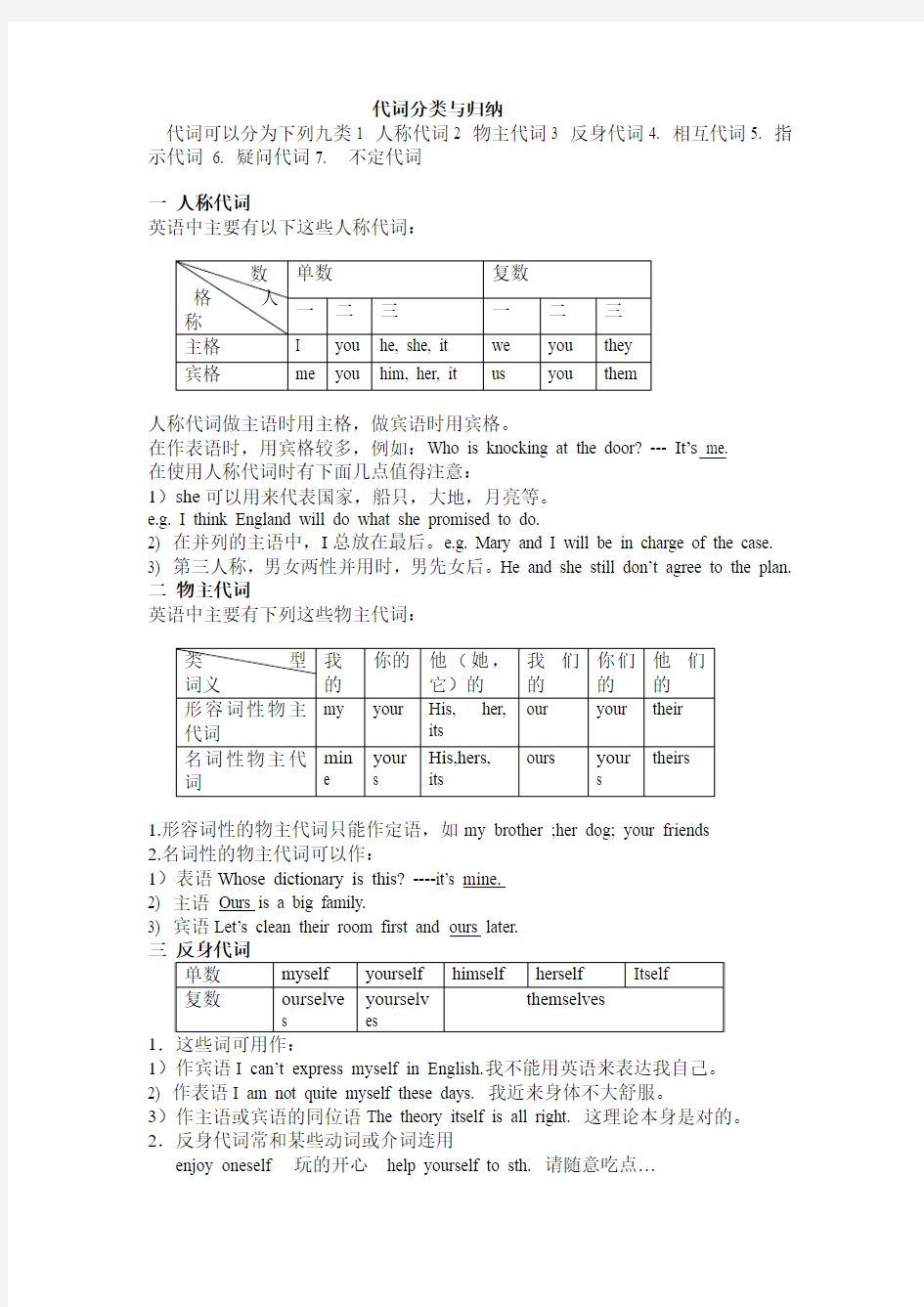代词分类与归纳

- 1、下载文档前请自行甄别文档内容的完整性,平台不提供额外的编辑、内容补充、找答案等附加服务。
- 2、"仅部分预览"的文档,不可在线预览部分如存在完整性等问题,可反馈申请退款(可完整预览的文档不适用该条件!)。
- 3、如文档侵犯您的权益,请联系客服反馈,我们会尽快为您处理(人工客服工作时间:9:00-18:30)。
代词分类与归纳
代词可以分为下列九类1 人称代词2 物主代词3 反身代词4. 相互代词5. 指示代词6. 疑问代词7. 不定代词
一人称代词
英语中主要有以下这些人称代词:
人称代词做主语时用主格,做宾语时用宾格。
在作表语时,用宾格较多,例如:Who is knocking at the door? --- It’s me.
在使用人称代词时有下面几点值得注意:
1)she可以用来代表国家,船只,大地,月亮等。
e.g. I think England will do what she promised to do.
2) 在并列的主语中,I总放在最后。e.g. Mary and I will be in charge of the case.
3) 第三人称,男女两性并用时,男先女后。He and she still don’t agree to the plan.二物主代词
英语中主要有下列这些物主代词:
1.形容词性的物主代词只能作定语,如my brother ;her dog; your friends
2.名词性的物主代词可以作:
1)表语Whose dictionary is this? ----it’s mine.
2) 主语Ours is a big family.
3) 宾语Let’s clean their room first and ours later.
三
1
1)作宾语I can’t express myself in English.我不能用英语来表达我自己。
2) 作表语I am not quite myself these days. 我近来身体不大舒服。
3)作主语或宾语的同位语The theory itself is all right. 这理论本身是对的。2.反身代词常和某些动词或介词连用
enjoy oneself 玩的开心help yourself to sth. 请随意吃点…
by oneself 一个人做(不要别人帮助)for oneself替自己,自己
四相互代词
One another与each other表示相互关系,称为相互代词,两者的用法是差不多的。We are eager to learn from each other(one another ).我们都急欲向彼此学习。
五指示代词
有this (这) , that (那) , these (这些) , those (那些).
注意:
1.前面刚提到的东西,英语中常用that (或those)表示,而汉语中却常用“这”
表示。
e.g. We have no time to do it. That’s our trouble.我们没有时间做这事。这就是我
们的问题。
2. 指下面要谈到的事物时,常用this, 例如
I want to know this: has John been here?
六疑问代词
有who, whom, whose, what, which都是来构成特殊问句的。Who通常做主语和表语,whom做宾语。
七不定代词
英语中有下面这些不定代词:all, each, every, both, either, neither, one, none, little, few, many, much, other, another, some, any, no.以及一些复合不
定代词,如:anyone, anybody, anything, someone, somebody, something, everyone, everything, nobody, nothing.
1 none, no one, nothing的用法区别
none即可指人,也可指物,且一定是特指,常用来回答how many/much引导的疑问句;no one只能指人,而且只能是泛指概念,常来回答who引导的疑问句;nothing 侧重于物,常用来回答what引导的疑问句。
----How many people are there in the room? ----- None.
――Who is in the room? ----- No one./nobody.
2 each 和every的区别
(1)each强调个体,every强调“全体”。
(2) every还可以表示“每隔......的;每......中的”
Every year or two每一两年every other day每隔一天every four years每四年3 another, other, the other, others, the others的用法
(1) another经常指三者或三者以上中的另一个,意思是“另外一个”,“又一个”表示泛指。
I don’t like this coat. Show me another, please.
(2)other表示“另外的”,只作定语。如: other studengts
(3)others泛指别的人或物,是other的复数形式,泛指别的人或物(但不是全
部,全部是“the others”) e.g.Some… Others
(4) the other,两者中的另一个.
八it的用法
1. 指代前面所提到过的人、物或事情,也可以指未提到过的但是谈话双方都明
白的事情、情况。
—Where is your backpack? —It’s on the chair.
2. 指代时间、天气、距离、环境等。
It is over one year since I came to this school.(时间)
It is warm in winter in Kunming.(天气)
It is about 2 kilometers away from here.(距离)
It is very quiet here.(环境)
3. 指代性别不明或性别被认为不重要的人或物。
Who’s the baby in the picture? Is it your brother? —No, it’s me.
4. it 做形式主语
1)It is +形容词(描述事件的形容词)+(for sb.) to do sth.
It is +形容词(描述人的形容词)+ (of sb.) to do sth.
It is important for you to learn English well. 对你来说学好英语是很重要的.
It was foolish of him to give up the job.他放弃那工作是愚蠢的。
2)It is time (for sb.) to do sth. 是某人做某事的时候了
It is time fou you to go to bed. 你该上床睡觉了
It takes sb. some time to do sth. 做某事花费某人多少时间
It took me two hour to do my homework 做我的作业花了我两个小时的时间.
It is one’s turn to do sth. 轮到某人做…..
It’s my turn to clean the classroom. 是轮到我打扫教室的了。
5 it作形式宾语
it作形式宾语时,可以代替三种形式:不定式、动名词和宾语从句。
I find it pleasant to work with him. 我觉得和他一起工作很愉快.
巩固练习:
( ) 1. Tom, Please pass ________ the glasses. I want to read the newspapers.
A. you
B. me
C. him
D. her
( ) 2. The English novel is quite easy for you. There are ______ new words in it.
A. a little
B. little
C. a few
D. few
( ) 3. ---You want ________ sandwich?
